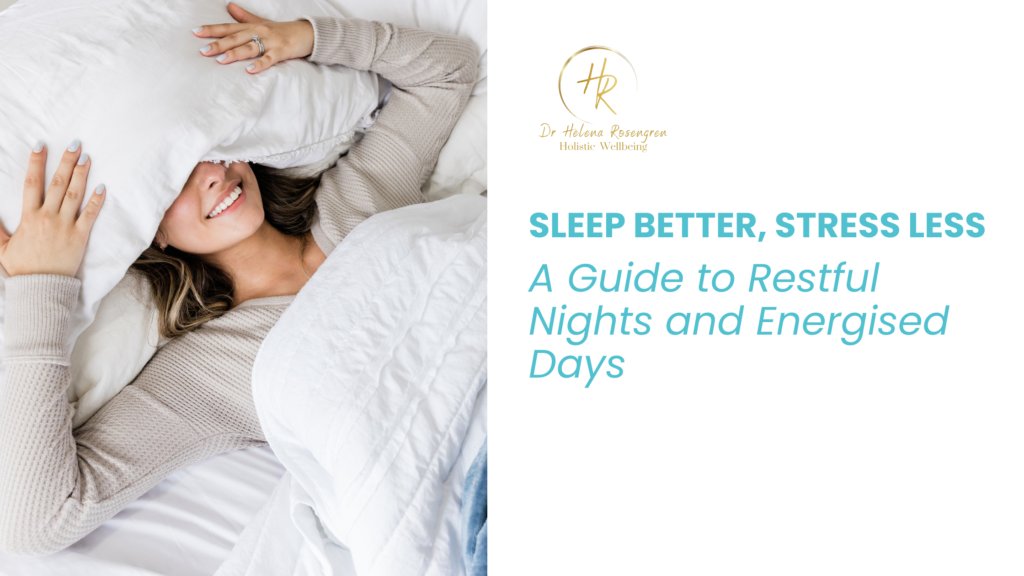In today’s fast-paced world, stress and sleep problems often go hand in hand, creating a vicious cycle that affects our overall wellbeing. However, achieving restful nights and energised days is within reach by incorporating a few simple practices into your routine. Here’s your guide to sleeping better and stressing less:
Create a Consistent Sleep Schedule

One of the most effective ways to improve your sleep quality is by establishing a consistent sleep schedule. Aim to go to bed and wake up at the same time every day, even on weekends. Consistency helps regulate your body’s internal clock, making it easier to fall asleep and wake up naturally.
Craft a Calming Bedtime Routine
Developing a relaxing pre-sleep routine can signal to your body that it’s time to wind down. Consider activities such as reading a book, taking a warm bath, or practicing gentle yoga stretches. Avoid screens and bright lights in the hour leading up to bedtime, as they can interfere with the production of melatonin, the hormone that regulates sleep.
Optimise Your Sleep Environment
Creating a conducive sleep environment can significantly impact the quality of your rest. Ensure your bedroom is cool, dark, and quiet. Invest in a comfortable mattress and pillows that support your sleeping posture. If needed, use blackout curtains or a white noise machine to minimise disturbances.
Be mindful of Your Diet and Hydration
What you eat and drink can affect your sleep. If you can, avoid all food and drink (other than water and relaxing herbal teas!) within 2 hours of bedtime, as they can disrupt your sleep cycle. Staying hydrated throughout the day is important, but try to limit fluid intake in the evening to prevent nighttime wakening.
Incorporate Relaxation Techniques

Practicing relaxation techniques can help reduce stress and prepare your body for sleep. Deep breathing exercises, progressive muscle relaxation, and mindfulness meditation are effective ways to calm your mind and body. Spending a few minutes on these practices before bed can make a significant difference in your sleep quality.
Stay Active During the Day
Regular physical activity can promote better sleep and reduce stress. Aim to get at least 30 minutes of moderate exercise most days of the week. However, try to avoid vigorous exercise close to bedtime, as it can have a stimulating effect and make it harder to fall asleep.
Limit Daytime Naps
While short naps can be refreshing, long or irregular napping during the day can negatively impact your nighttime sleep. If you need a power nap during the day, try to limit it to 20 minutes by setting an alarm and avoid napping late in the afternoon and evening.
Manage Stress Effectively
Chronic stress can wreak havoc on your sleep. Finding healthy ways to manage stress can improve both your sleep quality and overall wellbeing. Consider incorporating stress-reducing activities into your daily routine, such as journaling, spending time in nature, or engaging in a hobby you enjoy.
Conclusion
Achieving restful nights and energised days is possible with a few intentional changes to your daily routine. By prioritising a consistent sleep schedule, creating a calming bedtime routine, optimising your sleep environment, and managing stress effectively, you can sleep better and stress less. Embrace these practices and discover the profound impact they can have on your overall health and happiness.

Explore Our Program Suites
Want to dive deeper into your personal growth and leadership development? Check out our Program Suites to find resources tailored to help you unlock your full potential.
Leave a Comment
What strategies have helped you prioritise rest and improve your wellbeing? Share your thoughts or ask questions below! We’d love to hear from you and continue the conversation on the power of sleep and personal growth.


